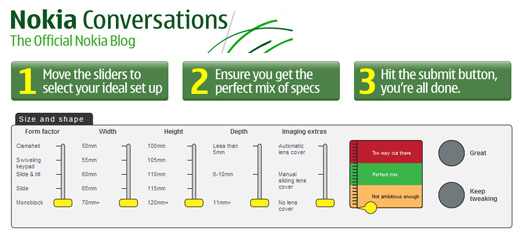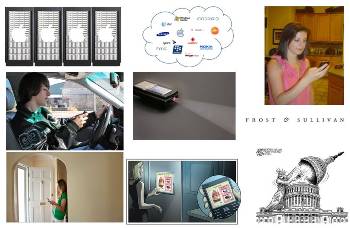
Wallet of the future? Your mobile phone [CNN]
In Asia, your mobile lets you make payments, access the subway, control your TV, and even open your front door. While some wonder if the technology will translate to the U.S., others think that mobile payments will take off here within five years. The article also goes over the low to high tech ways to pay, including RFID, barcodes and SMS.
Facebook Grew Twice As Fast As Twitter In July [TechCrunch]
Between April and July, Facebook grew 30% in unique U.S. visitors, while Twitter only grew 25%, an increase that could be attributed to the launch of their “Everyone Button". This gave Facebook members who didn’t have public profiles (i.e. most people) the option to share items in their stream with everyone else on Facebook on an item-by-item basis. Not only did this drive more people to Facebook, but it also increased the time spent on the site.
Yellix Dials in to Mobile Social Networking [Kelsey Group Blogs]
There is a lot of potential to leverage the phone's address book as the ultimate social network. To this end, Yelix has released an app for Android phones that automatically shows Facebook picture and status when receiving a call from a friend.
User Interface IS the Holy Grail [Wireless Week]
The user interface on a mobile phone is of the utmost importance, and its future lies in cloud computing. The cloud will lead to increasingly sophisticated applications, which in turn will offer the end user a higher degree of personalization.
As Ad Spending Declines, Magazines Move to Mobile [GigaOM]
Nearby Now seeks to move magazine advertising to mobile phones. The digital shopping service app lets users find and reserve products they’re looking for in local brick-and-mortar stores, as well as directing users to web sites to purchase products online.
“Leaf” Phone Runs On Solar Power, Doubles As Wristwatch [PSFK]
The Leaf is a cellphone that runs on solar power and is made of flexible material that enables it to double as a wristwatch. Lower-end phones might end up being simple, small, and eco-friendly.
Made-For-Mobile Comics: The Future of Pulp? [CNN]
To follow its audience, the comic industry has been slowly but surely offering paid content on the mobile screen, a move the print industry seems to have come to terms with.
Nokia Rocks the World: The Phone King's Plan to Redefine Its Business [Fast Company]
Nokia is evolving from a hardware company into a content provider, with grand plans to become the biggest entertainment media network in the world. Can they do it? "Look at the real world: It's not about people in the high end," says one Gartner analyst. "The real world is people in the middle, and Nokia owns that world in terms of numbers. They may not own mindshare, but they certainly have a lot to work with."
Xbox Gaming Platform May Soon Span Web, Console, Mobile [Ars Technica]
A recent job posting from Microsoft suggests that they are looking to bring the Xbox Live, Windows Mobile, and other similar properties closer together. More specifically, there's talk of a "casual and social gaming platform" that would be available across platforms and devices.
Augmented Reality Game Plus Facebook Equals Gaming for the Future? [Technomix]
Zugara's “Cannonballz” game uses the motion capture technology from their Webcam Shopper to “appear” in the gameplay. In this case, they are dodging cannonballs while trying desperately to save their friends (which are imported via a Facebook Connect integration) and accumulate points. Once their game is over, people can share their scores and the game by uploading it to their Facebook stream.
In Terms of Mobile Data Traffic, a Month in 2014 Will be More Than Whole 2008 [IntoMobile]
ABI Research has found that mobile data usage is going to increase so much that by 2014 there will be more data transfers in a one month than in all of 2008.
Cell Phone Sales Declined 6% in Q2 2009, Smartphone Sales Grew 27%
[Unwired View]
Research from Gartner points to the decline of cell phone sales in general, while smarphone sales have gone up 27%. The demand for "more than just a phone" is high.

















